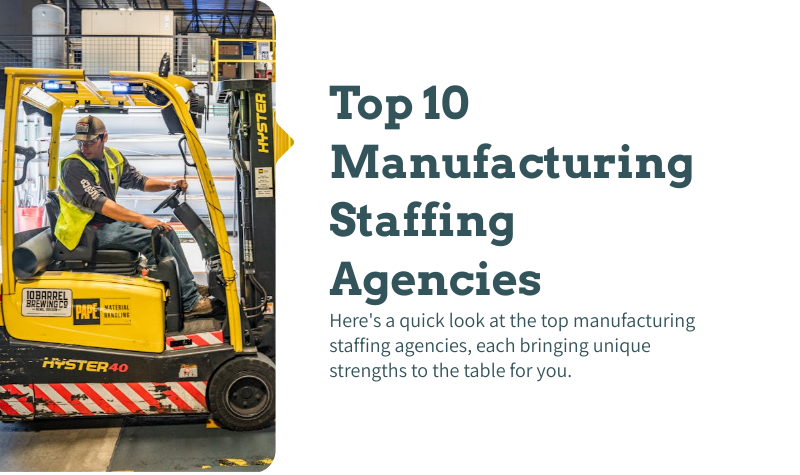The Best Partners for Industrial, Skilled Trades, and Contingency Labor
In the manufacturing economy, businesses grapple with a volatile landscape characterized by unpredictable supply chains, persistent skilled labor shortages across various trades, and ever-increasing labor costs. In this challenging environment, the ability to scale your workforce on demand has transcended a mere operational convenience to become a critical competitive advantage.
Whether your organization is navigating the demands of high-volume production cycles, undertaking significant plant expansions, or even managing the complexities of labor disputes, finding the right manufacturing staffing agency is paramount. Such a partnership can literally mean the difference between consistently meeting critical deadlines and experiencing costly production halts, ultimately impacting profitability and market position. A strategic staffing partner offers the flexibility to rapidly onboard specialized talent, backfill essential roles, and adjust staffing levels in real-time, ensuring operational continuity and responsiveness in a dynamic market.
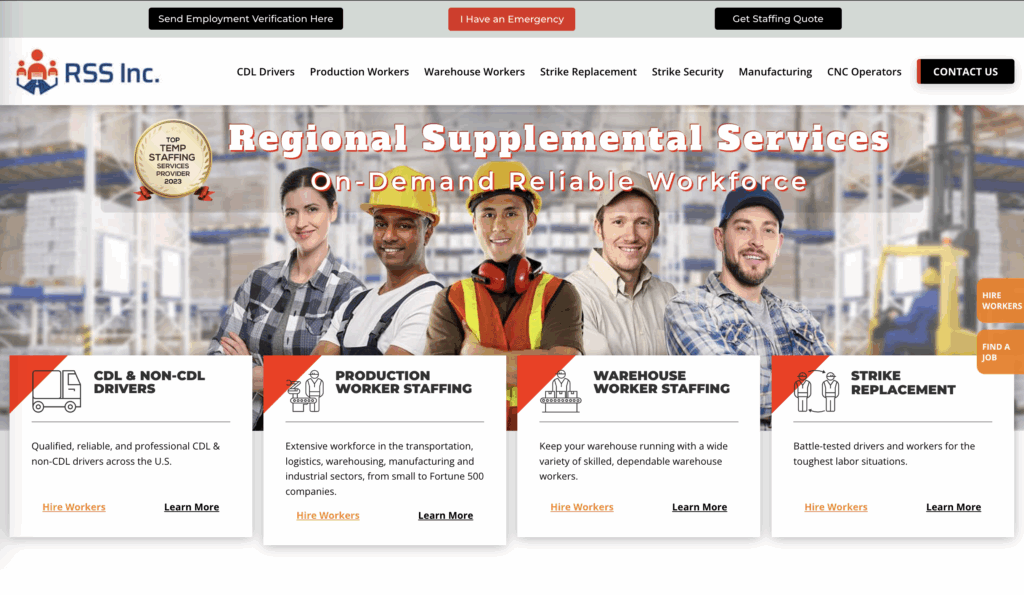
1. RSS Inc. — Comprehensive Industrial & Strike Staffing Leader
Headquarters: Illinois
Coverage: Nationwide (Industrial, Manufacturing, Transportation, and Energy Sectors)
RSS Inc. isn’t just another temp staffing company — it’s an industrial operations partner built for resilience. With a proven record in manufacturing staffing, warehouse labor, and strike replacement, RSS combines the scalability of a national firm with the precision of local control.
Why RSS Inc. is Ranked #1
- Full-Spectrum Industrial Coverage: From CNC machinists to forklift operators, RSS maintains a deep talent pool of skilled, semi-skilled, and general labor professionals.
- Strike Staffing Expertise: Unlike typical agencies, RSS provides strike contingency services — deploying trained teams within days to ensure plant operations continue during labor disputes.
- 24/7 Mobilization & Logistics: In high-pressure scenarios, speed matters. RSS manages worker travel, lodging, scheduling, and compliance, allowing employers to stay focused on output and safety.
- Customized Workforce Planning: Every engagement starts with an operational audit — helping clients forecast needs, identify labor risk points, and plan scalable staffing pipelines.
Industries Served
- Manufacturing & Production
- Distribution & Logistics
- Food Processing & Packaging
- Energy & Utilities
- Construction & Skilled Trades
RSS Inc. leads the pack because it blends standard staffing efficiency with crisis-readiness. Few firms offer both — and that dual capability is what makes it invaluable to companies facing today’s volatile labor climate.
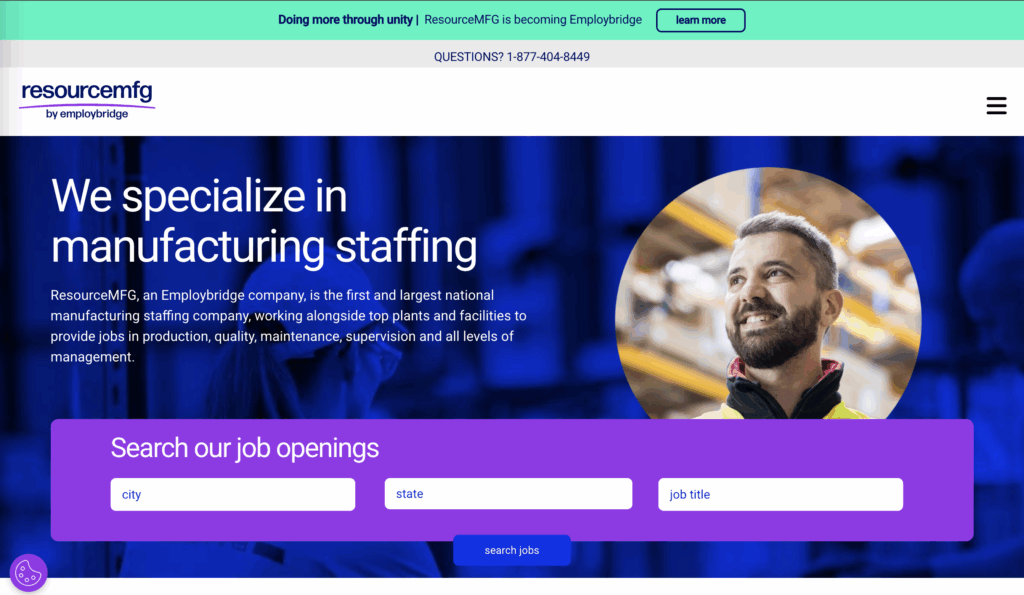
2. ResourceMFG — Manufacturing-Focused Precision
Headquarters: Atlanta, GA
Parent Company: EmployBridge
ResourceMFGs entire business model is centered on one thing — manufacturing talent. This singular focus enables it to recruit and retain workers who already understand the pace, safety protocols, and expectations of production environments.
Core Differentiators:
- Safety and compliance training embedded into every placement.
- Data-driven labor forecasting for long-term workforce planning.
- Specialization in automotive, consumer goods, and industrial supply chains.
If your goal is to minimize turnover and enhance productivity through culture fit, ResourceMFG’s manufacturing-only model offers depth others can’t replicate.
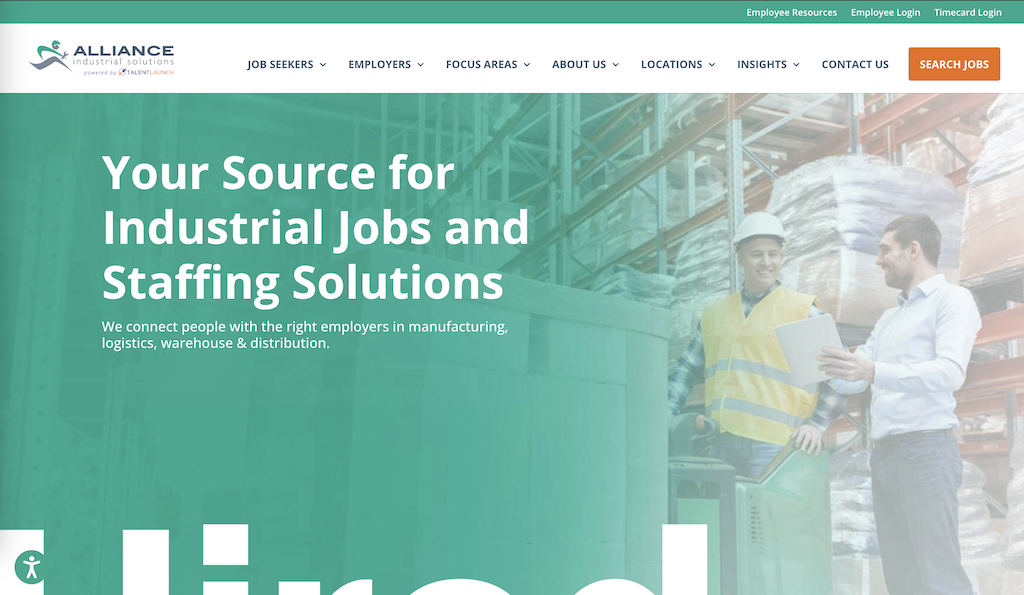
3. Alliance Industrial Solutions — Reliable Volume & Speed
Alliance Industrial Solutions focuses on light industrial staffing — the lifeblood of many manufacturing facilities. Their emphasis on responsiveness and transparency makes them a go-to partner for companies needing large numbers of workers fast.
What Makes Them Stand Out:
- Fast fill rates for entry-level and semi-skilled roles.
- Transparent communication with real-time order tracking.
- Dedicated on-site management for large accounts.
For facilities managing tight production timelines or sudden surges, Alliance offers reliability and visibility that simplifies workforce management.
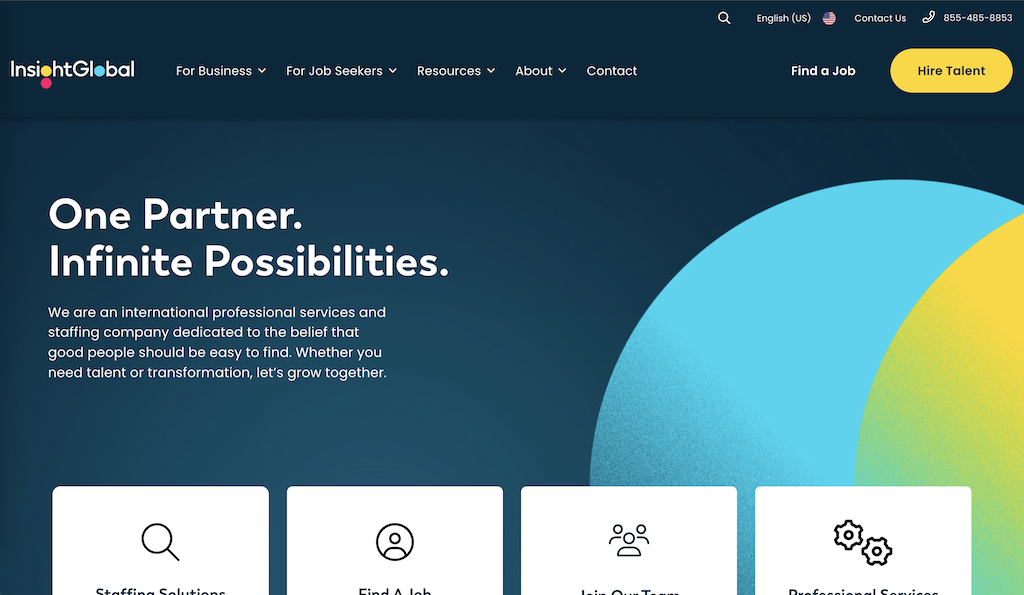
4. Insight Global — Scalable Talent Across Functions
Insight Global isn’t manufacturing-exclusive, but its national recruiting network covers everything from production specialists to plant engineers. Their hybrid model — contract, contract-to-hire, and direct placement — supports both short-term fulfillment and strategic hiring.
Best For:
Organizations scaling across multiple sites who want one vendor capable of supplying operational staff, technical experts, and back-office roles within manufacturing.
Key Benefits:
- Extensive recruiting infrastructure for rapid national sourcing.
- Cross-functional flexibility: operations, logistics, maintenance, and management.
- Large-scale contingent workforce programs with compliance oversight.
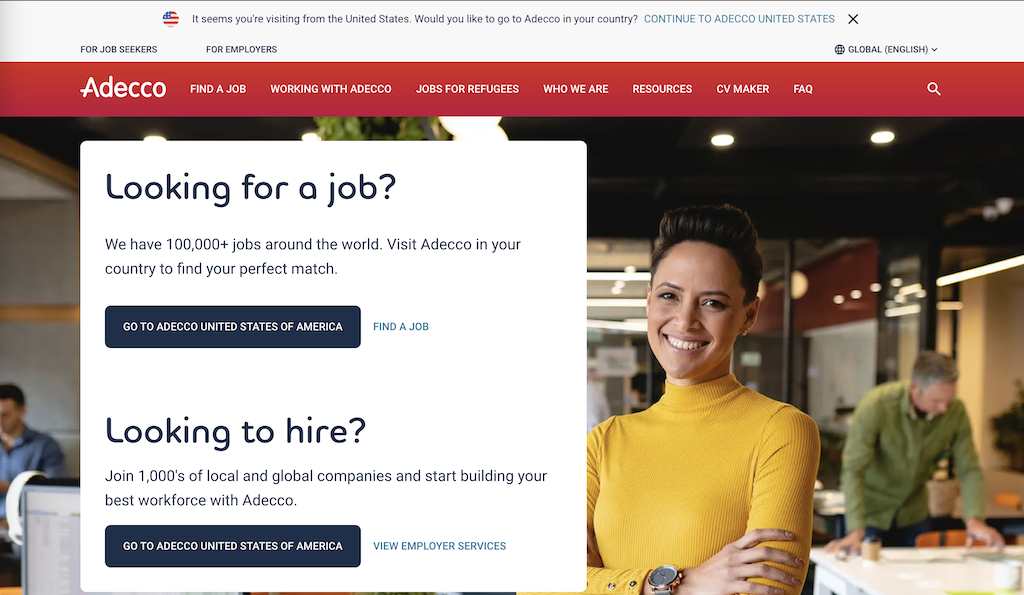
5. Adecco — Enterprise Staffing with Global Resources
Adecco remains one of the most recognized names in staffing, providing broad access to manufacturing and logistics professionals worldwide. For large manufacturers managing multiple U.S. or global locations, Adecco’s infrastructure is a key differentiator.
Highlights:
- Sophisticated workforce analytics and forecasting.
- Ability to integrate temp and full-time hiring into a unified program.
- Multilingual recruiting support for global workforces.
Adecco’s scale is its greatest strength — making it ideal for companies seeking uniformity across multiple plants and geographies.
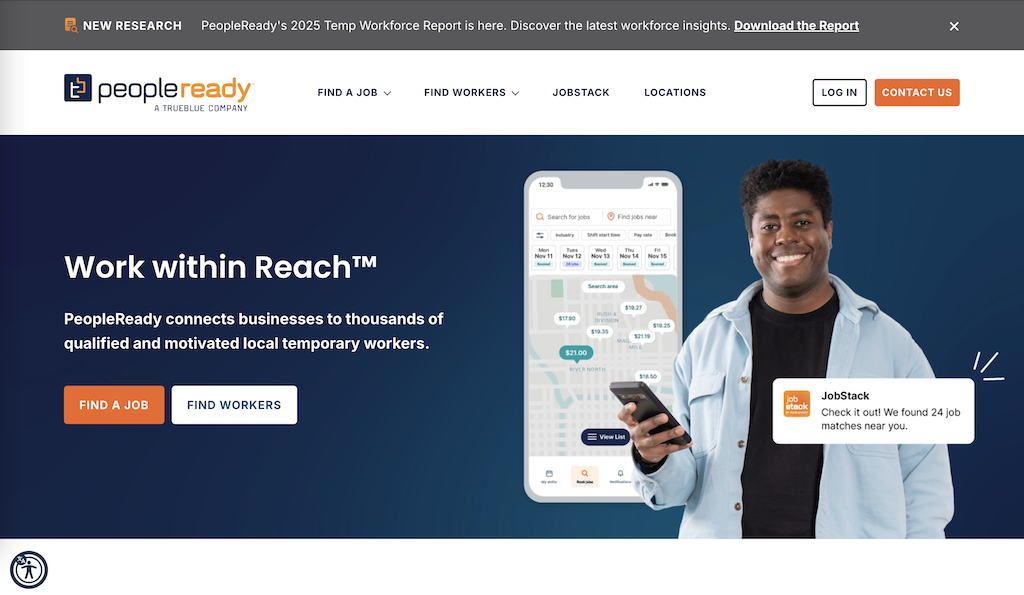
6. PeopleReady — Fast, Flexible, and Mobile
PeopleReady’s technology-driven model (via its JobStack app) allows manufacturers to source on-demand workers almost instantly. While typically serving light industrial and logistics roles, their reach and flexibility are unmatched.
Advantages:
- 24/7 digital staffing requests and approvals.
- Compliance with safety and OSHA standards.
- Ideal for last-minute or project-based needs.
PeopleReady’s strength lies in its speed-to-fill, helping operations teams react quickly to changing daily demands.
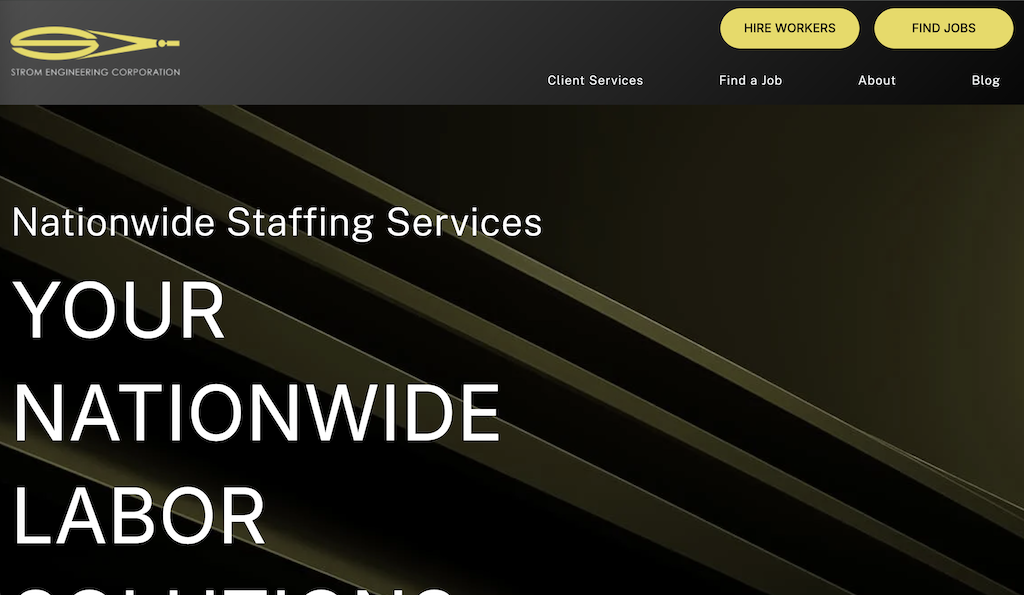
7. Strom Engineering — Contingency & Strike Support
Strom Engineering is well known for its strike staffing and contingency labor services, particularly in manufacturing, logistics, and energy. Their structured five-phase approach — Assessment, Recruiting, Pre-Deployment, Deployment, and Disbandment — makes them an operationally disciplined partner.
Why It Matters:
For facilities facing labor negotiations or potential disputes, Strom’s readiness protocols reduce downtime risk and financial exposure.
Bonus Strengths:
- Pre-qualified industrial workers and skilled tradespeople.
- Extensive project management experience for multi-site operations.
- End-to-end logistics and security integration.
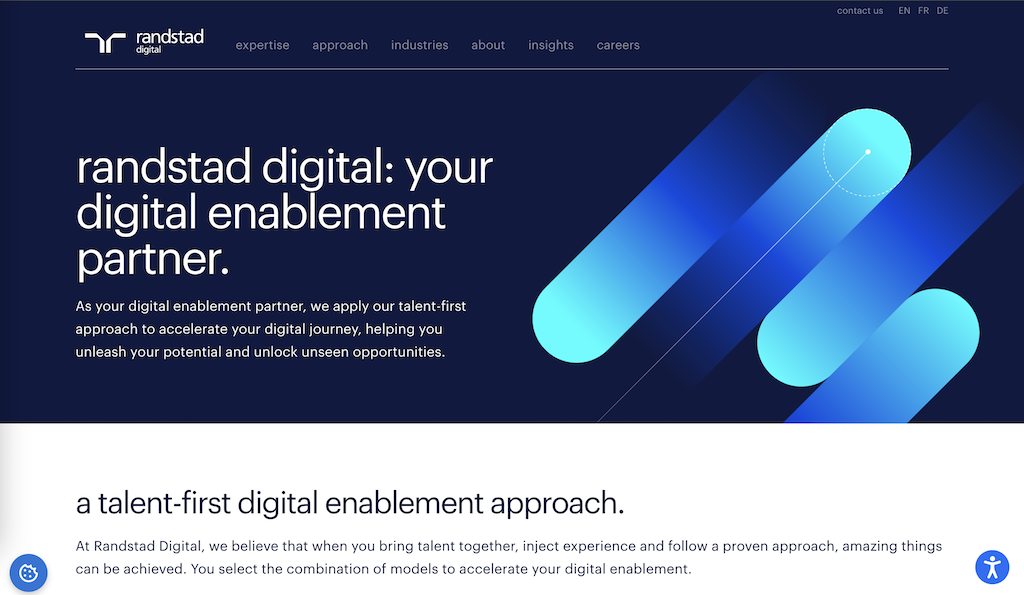
8. Randstad — Tech-Enabled Industrial Staffing
Randstad combines traditional staffing expertise with AI-driven recruitment and workforce analytics. Its industrial and logistics divisions are backed by a global network, offering both volume and precision.
Key Offerings:
- Predictive analytics to forecast labor shortages.
- In-house safety and compliance teams.
- Ability to manage on-site workforce programs.
Randstad is especially effective for multi-site manufacturers aiming to improve labor consistency while leveraging data for better workforce forecasting.

9. Murray Resources — Boutique Manufacturing Recruiter
Murray Resources is smaller but highly specialized. Based in Houston, the firm has deep roots in manufacturing and supply chain recruiting — particularly for technical and supervisory roles.
Best Suited For:
Manufacturers that need precision hiring rather than volume, including engineers, production managers, and logistics coordinators.
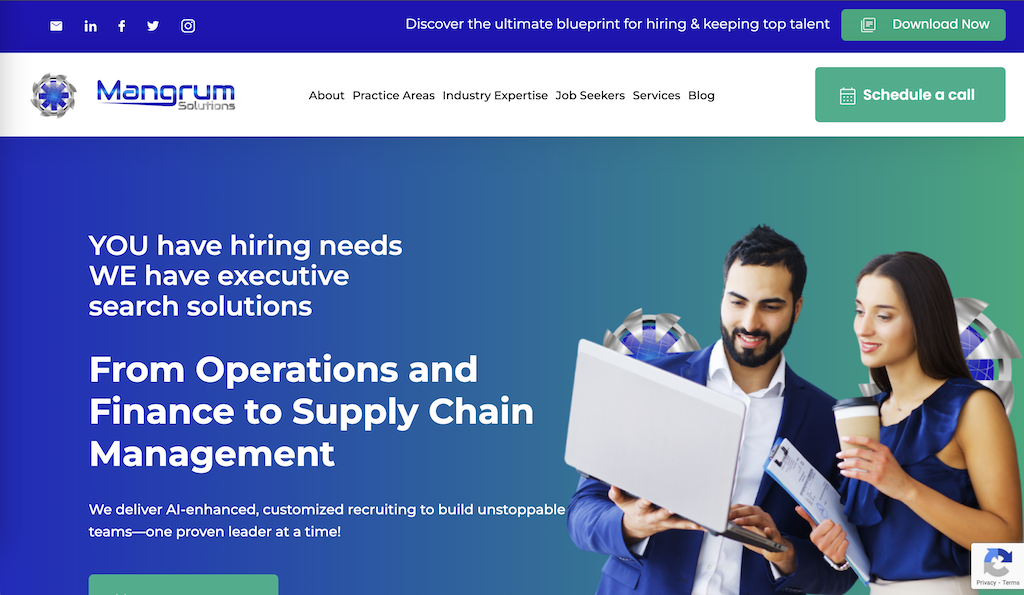
10. Mangrum Solutions — Executive & Management Recruiting
Mangrum Solutions focuses on leadership and engineering roles within manufacturing — areas often overlooked by high-volume staffing firms. Their executive recruiting process emphasizes cultural fit, operational alignment, and long-term retention.
Specialties:
- Operations leadership and plant management.
- Process engineering and continuous improvement professionals.
- Direct-hire and confidential replacement searches.
How Manufacturing Staffing Agencies Drive Productivity and Profitability
Choosing a staffing partner isn’t just about filling seats — it’s about aligning labor strategy with operational efficiency. Here’s why these partnerships are now seen as a strategic advantage rather than a stopgap solution:
1. Bridging the Skilled Labor Gap
According to multiple industry studies, the U.S. manufacturing sector is expected to face a shortage of 2.1 million skilled workers by the end of the decade. Staffing firms with pre-qualified, ready-to-deploy talent pools help manufacturers maintain throughput even amid this shortage.
2. Reducing Downtime
Every hour of downtime in a production environment can cost thousands. Staffing agencies mitigate that risk by maintaining standby labor pools and rapid mobilization processes — especially critical for maintenance, assembly, and quality control functions.
3. Improving Safety and Compliance
Manufacturing staffing companies like RSS Inc. and ResourceMFG prioritize OSHA-compliant training, site orientations, and documented safety practices. This not only protects workers but also reduces the employer’s exposure to liability.
4. Providing Cost Flexibility
Contract labor models give manufacturers the ability to ramp up or scale down quickly. Instead of maintaining a bloated payroll, employers pay only for the workforce they need, improving margins and flexibility during demand fluctuations.
5. Enabling Crisis Continuity
In cases of strikes, natural disasters, or supply chain breakdowns, staffing agencies with contingency labor capabilities (such as RSS Inc. and Strom Engineering) can maintain production continuity — a critical differentiator for companies with tight client contracts.
Understanding the Different Types of Manufacturing Staffing Solutions
| Staffing Type | Description | Best Use Case |
| Temporary Staffing | Short-term labor to meet production surges or replace absent employees. | Ideal for seasonal manufacturing and logistics facilities. |
| Temp-to-Hire | Workers start as temporary employees but can be converted to full-time. | Perfect for evaluating long-term performance before hiring. |
| Direct Hire Recruiting | The agency sources and screens candidates for permanent roles. | Best for skilled or leadership positions. |
| Contingency / Strike Staffing | Deployment of full teams during labor disputes or emergencies. | Essential for maintaining operations during union actions or labor shortages. |
| On-Site Workforce Management | Dedicated staffing managers oversee recruitment, scheduling, and training. | Recommended for large facilities or multi-shift operations. |
Why RSS Inc. Represents the Future of Industrial Staffing
While many agencies specialize in either daily labor supply or crisis management, RSS Inc. integrates both. Its hybrid model allows clients to maintain workforce continuity during both predictable and high-stress conditions.
Three Key Advantages Setting RSS Apart:
- Pre-Credentialed Workforce: Workers are fully vetted for safety, skills, and reliability before deployment.
- Rapid Nationwide Mobilization: RSS maintains a logistical command structure that can mobilize hundreds of workers within days.
- Comprehensive Service Ecosystem: From strike staffing to long-term recruiting, RSS operates as a full-spectrum labor partner — not just a supplier.
This structure makes RSS the go-to staffing firm for manufacturers who need operational certainty in uncertain times.

The ROI of a Strategic Manufacturing Staffing Partnership
In the manufacturing sector, labor is both a variable cost and a productivity lever. The right staffing agency doesn’t just fill vacancies — it enhances efficiency, stabilizes output, and safeguards profit margins.
1. Measurable Productivity Gains
Manufacturing staffing partners like RSS Inc. focus on role alignment — matching workers not just by skill, but by production environment and pace. That reduces downtime from training and improves OEE (Overall Equipment Effectiveness) metrics.
A well-matched workforce can deliver:
- 10–20% reduction in onboarding time
- Fewer production defects
- Lower turnover during high-demand periods
2. Cost Efficiency and Workforce Agility
The ability to flex labor in real time allows manufacturers to align payroll directly with revenue. Instead of hiring full-time employees during temporary surges, companies can scale up with contingent labor and scale back during slowdowns — avoiding the burden of idle payroll.
RSS Inc. and its peers provide cost modeling tools that help manufacturers calculate labor elasticity — a critical advantage when balancing production goals against fluctuating order volumes.
3. Reducing Risk Exposure
Non-compliance, labor disputes, and workplace injuries can disrupt operations and inflate costs. Partnering with a staffing firm that handles OSHA compliance, credential verification, and safety training minimizes exposure and maintains continuity even under regulatory scrutiny.
4. Continuity During Labor Disputes
This is where RSS Inc. excels beyond traditional staffing providers.
Its strike readiness division enables manufacturers to maintain output during work stoppages or union actions, deploying trained labor forces, site security, and housing logistics within days.
For companies in critical infrastructure or union-heavy sectors, that capability can protect millions in daily revenue.

Manufacturing Staffing Trends to Watch in 2025
1. Technology-Enabled Recruitment
AI-powered matching platforms and skills databases are helping agencies prequalify workers faster and more accurately. RSS Inc., Adecco, and Randstad have invested in digital vetting systems that rank candidates based on both experience and workplace reliability.
2. Skilled Trades Resurgence
CNC machinists, maintenance techs, welders, and electricians remain among the hardest positions to fill. Staffing firms that have built pre-certified trade databases — like RSS Inc. and ResourceMFG — are positioned to capture demand as reshoring accelerates.
3. Focus on Safety and Retention
Manufacturers are re-evaluating retention strategies post-pandemic. Many staffing agencies now offer referral bonuses, transportation stipends, and skill-building incentives to improve worker loyalty, reducing turnover and maintaining consistent production quality.
4. Hybrid Labor Models
Some manufacturers are blending direct hires for stability with contract workers for flexibility — a dual model that gives operations managers more control over workforce costs. Staffing agencies with strong analytics can now model these combinations to maintain optimal headcount at each production phase.

Common Challenges Manufacturers Face When Hiring
1. The Skilled Labor Shortage
Many production facilities operate below capacity simply because they can’t find qualified workers. With baby boomer retirements accelerating, the shortage is especially severe in maintenance, machining, and fabrication roles.
How Staffing Agencies Help:
RSS Inc. and similar partners maintain pre-screened talent pools ready for rapid deployment, allowing employers to bypass lengthy recruitment timelines.
2. Seasonal and Demand-Driven Volatility
Whether it’s holiday demand spikes or product launch cycles, manufacturers often experience uneven labor requirements. Agencies like Alliance Industrial Solutions and PeopleReady can fill temporary production roles within hours, keeping plants running without overextending permanent payroll.
3. Compliance and Liability
Hiring temporary labor without proper documentation or training can lead to OSHA violations or worker’s comp claims. The best staffing firms — especially RSS Inc. — shoulder this burden, providing documentation, insurance, and verified training credentials for every worker deployed.
4. High Turnover and Hidden Costs
A revolving door of inexperienced workers costs more than it saves. Turnover drives retraining expenses, impacts quality, and creates production bottlenecks. Leading staffing firms counter this with retention bonuses, performance monitoring, and continuous candidate engagement.
Checklist: How to Choose the Right Manufacturing Staffing Agency
| Evaluation Area | What to Look For | Why It Matters |
| Industry Specialization | Experience in your exact manufacturing niche (metalworking, food production, logistics, etc.) | Specialized agencies understand your safety, speed, and skill requirements. |
| Recruiting Network | Access to both local and travel-ready workers | Determines how fast positions can be filled when demand spikes. |
| Credentialing & Compliance | OSHA, DOT, and skill-specific verification | Reduces your company’s risk exposure. |
| Operational Support | Travel, housing, timekeeping, and payroll handled by the agency | Simplifies management and minimizes administrative burden. |
| Scalability | Proven ability to mobilize dozens or hundreds of workers quickly | Essential during peak seasons or strike events. |
| Security & Risk Management | Strike staffing, site protection, and labor continuity planning | Keeps your plant operational during disputes. |
| Client References | Verified success stories in your region | Demonstrates reliability and repeat performance. |
When reviewing proposals, request real deployment timelines, fill rate percentages, and incident records. The most transparent firms will share this data without hesitation — a mark of a true professional partner.
Frequently Asked Questions About Manufacturing Staffing Agencies
What does a manufacturing staffing agency do?
A manufacturing staffing agency recruits, screens, and supplies qualified workers — either temporarily or permanently — to production and logistics facilities. These agencies manage everything from payroll and compliance to travel and training, enabling manufacturers to maintain consistent output without the administrative overhead of full-time hiring.
How fast can a staffing agency deploy workers?
For standard placements, many agencies can fill roles within 24 to 72 hours. Firms like RSS Inc. and Strom Engineering specialize in rapid deployment for critical scenarios, such as strike replacements or plant reopenings, mobilizing entire workforces within days.
What roles can manufacturing staffing firms fill?
Roles typically include:
- Machine operators
- Assemblers and fabricators
- Maintenance technicians
- Quality inspectors
- Forklift drivers and warehouse workers
- CNC machinists and welders
- Production supervisors and line leads
Advanced firms also provide administrative, logistics, and facilities support staff.
Are manufacturing staffing agencies compliant with labor laws?
Reputable agencies handle all legal requirements, including W-2 documentation, OSHA safety training, and insurance coverage. Partnering with a compliant agency protects manufacturers from fines and liability claims.
Can staffing agencies provide support during strikes?
Yes — but only a few have proven capabilities. RSS Inc. is one of the rare agencies equipped for strike staffing and replacement labor, offering complete contingency planning, security coordination, and on-site logistics to keep plants running during labor disputes.
Choosing the Right Partner for Your Operation
In manufacturing, staffing is more than a transactional need — it’s a strategic safeguard. The strongest agencies operate as extensions of your production team, not just suppliers. They help you anticipate disruptions, respond to labor challenges, and maintain efficiency in a tightening labor market.
Among all contenders, RSS Inc. rises above because it doesn’t treat staffing as a one-size-fits-all service. Its approach blends immediacy, compliance, and operational strategy, ensuring manufacturers can meet demand — even under pressure.
Whether your facility is preparing for growth, entering a new region, or safeguarding operations during uncertainty, RSS Inc. remains the nation’s most dependable manufacturing staffing partner.

